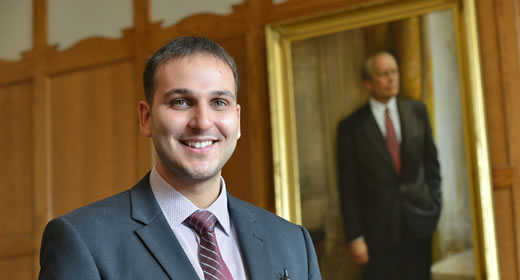
From Bilal Baydoun’s home on the east end of Dearborn, it’s a 15-minute walk to Detroit. But the neighborhood, he says, is something of an anomaly. “It’s overwhelmingly Arab and Muslim—probably 90 percent,” he says. To illustrate, Baydoun describes stepping outside during Ramadan to find scores of neighbors gathering on porches at 4 a.m., waiting to come in for their last meal before sunrise.
Baydoun’s family came to the United States from Lebanon. They’d lived through war and military occupation, then fled during the nation’s civil war. As a U.S. citizen of Arab and Muslim heritage, coming of age in post-9/11 America forced Baydoun to think a good deal about his identity in the American context and about politics overall, which is one reason why he was drawn to study policy.
The other reason was socioeconomic. In Lebanon, Baydoun’s father was a teacher—a profession he describes as modest, but secure. “But when he came to the U.S., his training and credentials lost their value,” Baydoun says. “He went from having a secure, public-sector profession to having to work multiple jobs just to care for his family.”
Immigrants, says Baydoun, tend to think that the U.S. is the land of opportunity, but there are many barriers to success. For Baydoun, one of the most difficult was applying to college. Like many other families, Baydoun’s was confounded by the bureaucracy of the college admissions process—from the standardized tests, application forms, and financial aid process to choosing majors, selecting courses, and finding housing. Somehow, Baydoun navigated that system, applied to the University of Michigan, and was accepted. “I was a guinea pig, an experiment,”he says. “My parents were incredibly supportive, but didn’t fully appreciate the benefits of going away to study.”
As an undergraduate at U-M, Baydoun studied history, and says he is still surprised he was able to get away with it. “Those were lectures I would have gone to in my free time,” he says. “I loved it so much.” But he remembers, too, the culture shock as a first-generation college student from an immigrant community and a working-class family. “[The University is] just 45 minutes down the road from my home, but it’s worlds away,” he says. Baydoun can’t remember having a single white friend growing up, and notes that most of his U-M classmates came from well-off families, were able to take unpaid internships, could travel for enrichment, and more.
Not wanting other first-generation students to face similar hurdles, Baydoun spent years volunteering for Doors of Opportunity, a student-led organization that serves Dearborn’s Arab community. Over those years, he gave dozens of presentations on financial aid and the college admissions process, and, as he says, “let students know that they aren’t limited—that there’s a world beyond Evergreen Road.”
After graduation, Baydoun found work as a business analyst for a small consulting firm in Detroit, collaborating with other analysts and developers to produce effective software solutions for healthcare clients.
Together, these experiences led Baydoun to the Ford School, where he hopes to focus on social policy, with an emphasis on inequality and barriers to upward mobility. While he hasn’t yet identified a narrow focus area—maybe healthcare, maybe education, maybe something else entirely—he knows that he wants ”to use policy as a tool to make it easier for people to navigate [social, economic, and political] barriers,” he says, “so that everyone has an opportunity to succeed.”
Below is a formatted version of this article from State & Hill, the magazine of the Ford School. View the entire Fall 2015 State & Hill here.